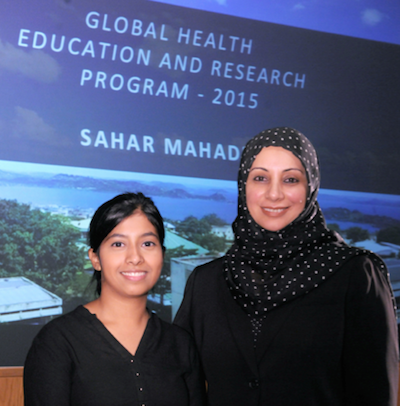October, 2015

Sahar Mahadik with Dr. Sohaila Cheema, director of the Global
and Public Health Division.
Second-year medical student Sahar Mahadik has shared her experiences of an “inspirational” summer spent helping and learning about healthcare in Tanzania on WCM-Q’s Global Health and Research Experience Program (GHERP).
Sahar spent eight weeks at Weill Bugando Medical Center in Mwanza, a port city on the southern shore of Lake Victoria, where she had the chance to see how local health workers care for a large population in an under-resourced environment.
During her time in Mwanza, Sahar took patient histories, shadowed local physicians on their ward rounds and traveled into the surrounding countryside to visit dispensaries that are often the first place local people go to when they have a health complaint.
Sahar also had the opportunity to contribute to ongoing research projects as part of the program, which is run by WCM-Q’s Global and Public Health Division and is now in its fifth year.
Giving a presentation about her trip to an audience of faculty members and fellow students, Sahar said: “The resourcefulness and dedication of the doctors and other health workers at Weill Bugando was truly inspiring. The hospital serves a huge number of people in the city and across the wider region and they work incredibly hard to make sure everybody gets the best care possible.”
In Tanzania there is a high prevalence of diseases that students do not usually see while working in high-income countries, such as malaria, tetanus and tuberculosis. There are also many motorcycle-related injuries and there is a high prevalence of schistosomiasis, a condition caused by a parasitic worm carried by freshwater snails that is spread by contact with contaminated water.
The GHER program allows students to conduct physical examinations of patients under the supervision of qualified physicians, helping them to develop essential diagnostic and communication skills.
Dr. Sohaila Cheema, director of the Global and Public Health Division, said: “In Mwanza, physicians cannot always rely on highly sophisticated equipment when they are attempting diagnosis, which is very different from the situation here in Doha where the hospitals are very well equipped. Our students who visit Weill Bugando therefore develop the time-honored, traditional skills of physicians of looking, listening and speaking with patients to make a correct diagnosis. I feel this is one of the key strengths of the program and it is highly beneficial for students to have this experience at an early stage in their training.”
Sahar added: “I found it extremely rewarding to be able to apply the knowledge I have learned in the classroom to the real world. For example, listening to and identifying a heart murmur, which was something I had only read about until then, was a truly valuable learning experience for me.”
Visits to an orphanage, local dispensaries and a center providing care to children with albinism gave Sahar a more comprehensive understanding of the healthcare situation in the region, while staying with a host family helped her to engage with the community and adjust to her new environment. Sahar also had the opportunity discover the diverse wildlife of Tanzania on a safari trip where she saw elephants, lions and zebras.
She added: “Tanzania is a beautiful country with wonderful people and I am sure this experience will stay with me for life. I am so happy that I embraced this opportunity.”
Dr. Ravinder Mamtani, associate dean for Global and Public Health, said: “The Global Health and Research Experience Program is a wonderful way for students to gain an understanding of the challenges faced by healthcare workers and patients in many parts of the world. At the same time, the students are able to develop essential skills related to patient care at an early stage in their training. We are extremely happy that Sahar grasped this opportunity with both hands and very pleased that she has served as a great ambassador for Weill Cornell Medicine – Qatar.”

